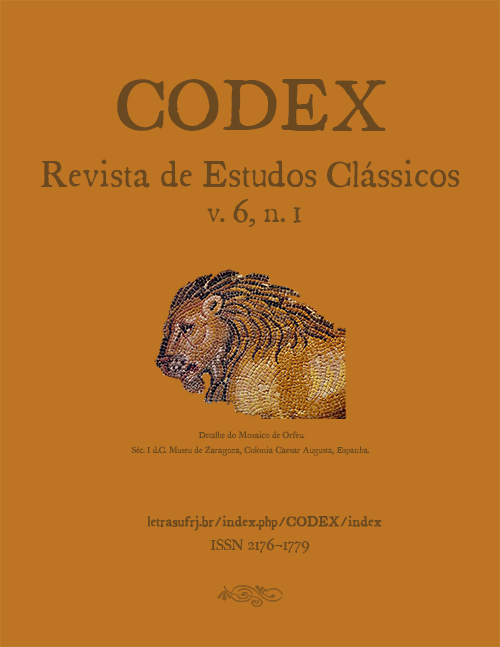Os Cavaleiros: a composição política e teatral
DOI:
https://doi.org/10.25187/codex.v6i1.13933Palavras-chave:
Aristófanes, teatro, política, comédiaResumo
Aristófanes, em Os Cavaleiros, apresenta a disputa política entre dois adversários para governar a casa do Povo, revelando meandros ardilosos para se chegar e se manter no poder. Neste artigo é analisada a relação entre o referencial histórico e a elaboração estética, a partir de: i) as personagens e o cotidiano político de Atenas; ii) criação poética e/ou retrato do cotidiano?; iii) a ação cômica: a realidade refletida no espelho da comédia; ponderando a construção aristofânica na correlação de estrutura e conteúdo a potencializar o jogo teatral. Nesse percurso, vê-se a fundante relação da comédia com os assuntos que movem a cidade -- aqui, a política e o teatro --, demonstrando que o espectador é parte fundamental dos dois fazeres: o político e o teatral. Ainda que passados séculos, essa comédia evidencia a pertinência da temática e da conformação das personagens, revelando a deterioração do ambiente político, identificado com facilidade pelo leitor/espectador contemporâneo.
Downloads
Referências
ARISTÓFANES. Os Cavaleiros. Tradução, notas e introdução de Maria de Fátima Sousa e Silva. Lisboa: edições 70, 2004.
ARISTÓFANES. Acarnenses. Tradução, notas e introdução de Maria de Fátima Sousa e Silva. In:______. Comédias. v. I. Lisboa: Imprensa Nacional -- Casa da Moeda; Coimbra: Faculdade de Letras da Universidade de Coimbra, 2006.
ARISTÓFANES. Nuvens. Tradução, notas e introdução de Custódio Magueijo. In: ______. Comédias. v. I. Lisboa: Imprensa Nacional -- Casa da Moeda; Coimbra: Faculdade de Letras da Universidade de Coimbra, 2006.
HEATH, M. “Aristophanes and the discourse of politics”. In: DOBROV, G. (Ed.) The city as comedy: society and representation in Athenian Drama. Chapel Hill: The University of North Carolina Press, 1997, pp. 230-49.
HENDERSON, J. “The demos and the comic competition”. In: WINKLER, J.; ZEITLIN, F. (Ed.). Nothing to do with Dionysos? Princeton: Princeton University Press, 1992, pp. 271-313.
LEÃO, D. “Pólis, teatro e exercício da cidadania”. In: ______. A globalização no mundo antigo. Coimbra: Imprensa da Universidade de Coimbra, 2012, pp. 67-84.
LOWE, N. J. Comedy. New York: Cambridge University Press, 2008.
McGLEW, J. F. Citizens on stage: comedy and political culture in the Athenian democracy. The University of Michigan Press, 2002.
SEGAL, E (ed). Oxford Readings in Aristophanes. Oxford University Press, 1996.
SILK, Michael. “The people of Aristophanes”. In SEGAL, E. (Ed.). Oxford Readings in Aristophanes. Oxford: Oxford University Press, 1996, pp. 229-251.
SILVA, Maria de Fatima Sousa e. Crítica do teatro na comédia antiga. Coimbra: Instituto Nacional de Investigação Científica, 1987.
SILVA. M. de F. S. Ensaios sobre Aristófanes. Lisboa: Cotovia, 2007.
SLATER, Niall. Spectator politics: metatheatre and performance in Aristophanes. Philadelphia: University of Pennsylvania Press, 2002
SUTTON, D. F. Ancient comedy: the war of generations. New York and Toronto: Twayne/Maxwell Macmillan, 1993.
TAPLIN, O. “Fifth-century tragedy and comedy”. In: SEGAL, E. (Ed.). Oxford Readings in Aristophanes. Oxford University Press, 1996, pp. 9-28.
ZIMMERMANN, Berhnard. The Paradoi of the Aristophanic Comedies. In: SEGAL, E. (Ed.). Oxford Readings in Aristophanes. Oxford: Oxford University Press, 1996, pp. 182-193.
Downloads
Publicado
Como Citar
Edição
Seção
Licença
A Codex - Revista de Estudos Clássicos utiliza uma licença Creative Commons - Atribuição-NãoComercial 4.0 Internacional.
Os autores dos trabalhos aprovados autorizam a revista a, após a publicação, ceder seu conteúdo para reprodução em indexadores de conteúdo, bibliotecas virtuais e similares.
A revista se permite o uso dos trabalhos publicados para fins não comerciais, incluindo o direito de enviar o trabalho para bases de dados de acesso público.










